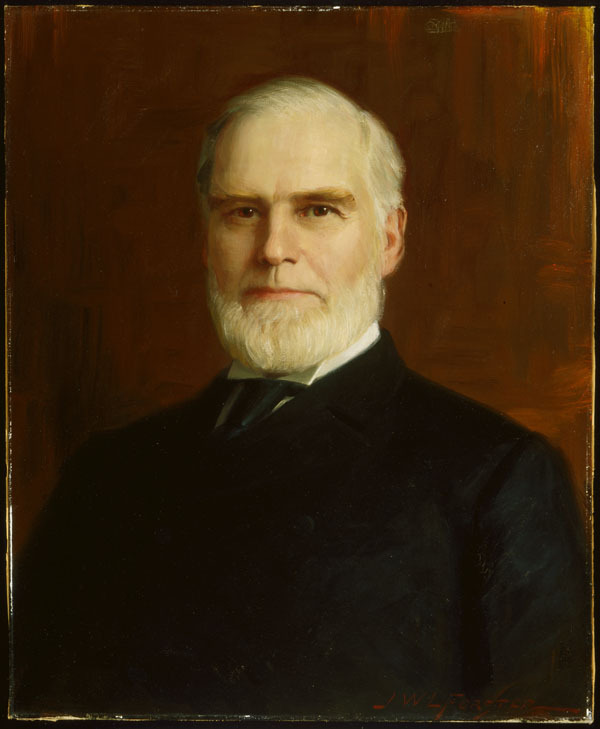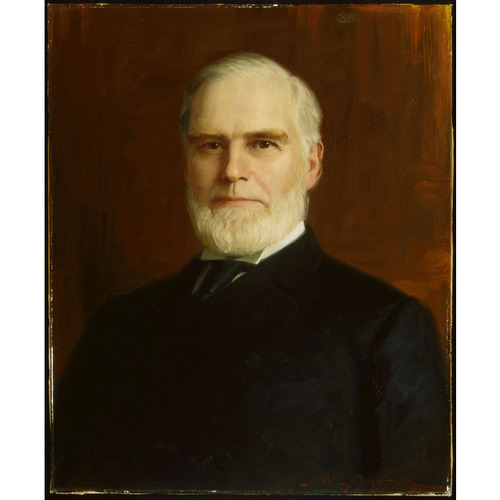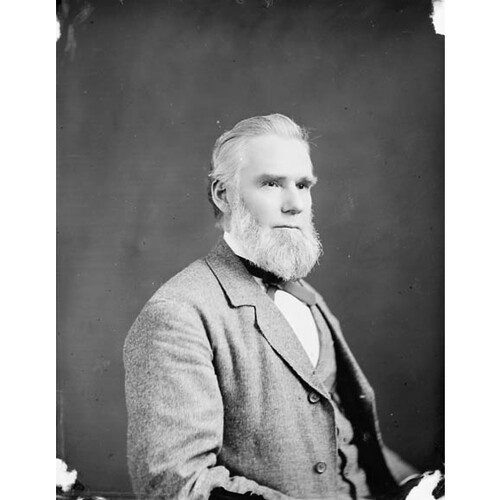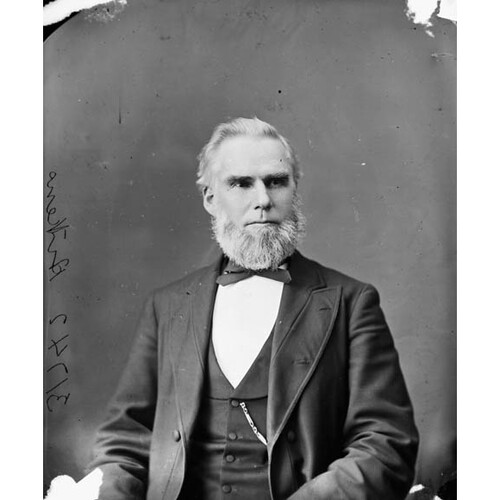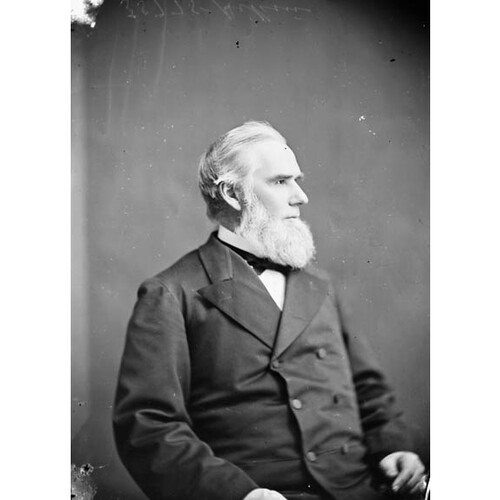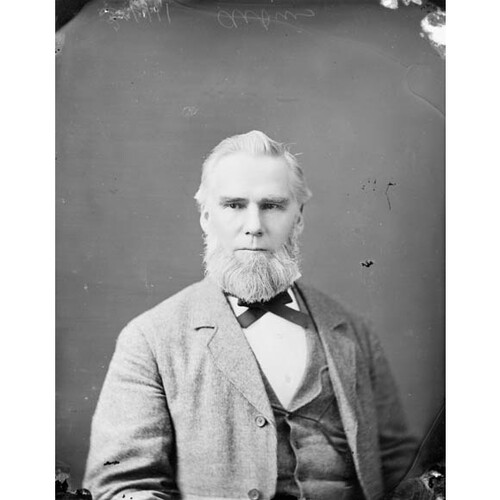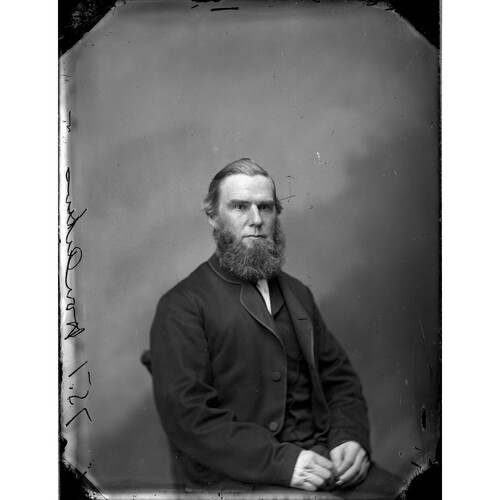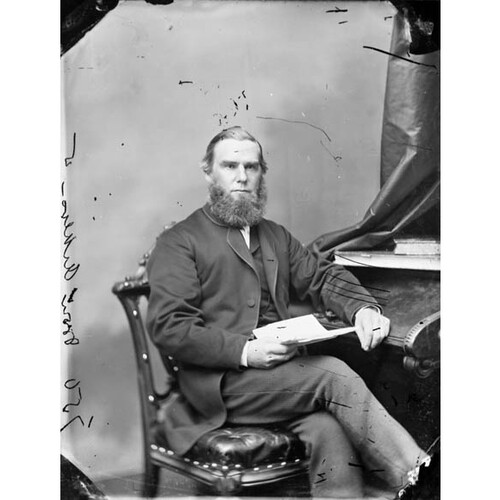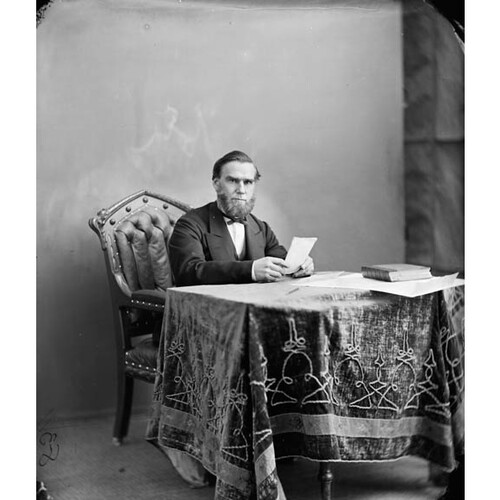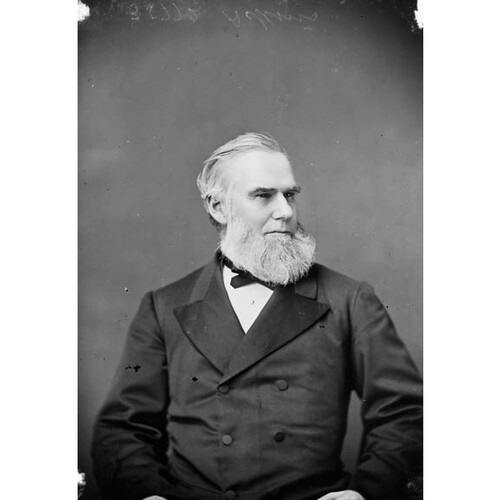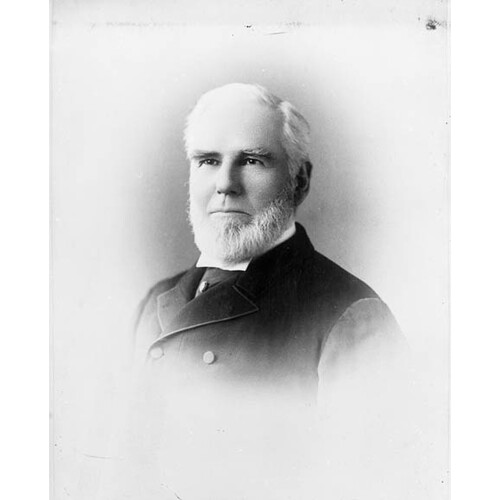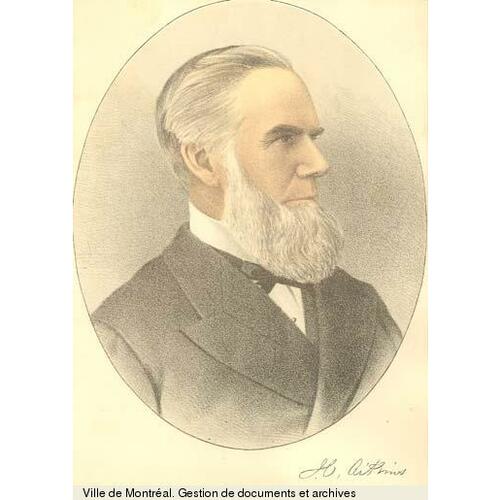AIKINS (Eakins), JAMES COX, farmer, politician, office holder, and capitalist; b. 30 March 1823 in Toronto Township, Upper Canada, son of James Eakins and Ann Cox; brother of William Thomas*; m. 5 June 1845 Mary Elizabeth Jane Somerset in Toronto, and they had five daughters and three sons, including Sir James Albert Manning* and William Henry Beaufort*; d. 6 Aug. 1904 in Toronto.
In 1816 James and Ann Eakins emigrated from County Monaghan (Republic of Ireland) to Philadelphia. After four years they moved to Toronto Township, where Eakins took up land about 13 miles west of York (Toronto). A Presbyterian, he converted to Methodism and made his home a local centre for worship. He sent his eldest son, James Cox Eakins, to the Methodist-run Upper Canada Academy (Victoria College) in Cobourg, from 1840 to 1845. James Sr was a successful farmer and he accumulated sufficient land to provide his sons with farms. Shortly after his marriage in 1845, James Cox received a lot in Toronto Gore Township and began farming on his own. Some time thereafter he changed the spelling of his surname to Aikins to resemble its pronunciation more closely.
Aikins did well at farming, but, given the appreciation in real-estate values in the late 1840s and 1850s, never so well as to acquire the quantity of land necessary to settle his own family on farms. Instead he turned to politics as a career. He declined the reform nomination in York West in the 1851 provincial election, but three years later he chose to run in the newly formed riding of Peel and was elected as a Clear Grit [see George Brown*]. Never a vigorous debater or parliamentarian, he none the less won re-election in 1857. During the next several years, however, his position in the riding was weakened by divisions over the separation of Peel County from York. Though the decision to separate had been made in 1856, rivalry concerning the location of the county seat stalled actual creation of the independent county until 1867. Aikins was pulled this way and that by supporters of various centres. Dissension within Reform ranks over the issue presented an opportunity for John Hillyard Cameron*, a Conservative, to regain a seat in the Legislative Assembly in the 1861 election. He drew the Orange vote and some support among Catholics, and his wide margin in the poll at Brampton, where electors suspected that Aikins did not favour their village as county seat, gave him the victory.
Aikins came back from defeat to contest the Home division seat in the Legislative Council in 1862. As an assemblyman, he had advocated the election of the upper house, and in his campaign he declared his commitment to democratic principles, foremost being representation by population. Aikins also wanted equal rights for all religious denominations and thus opposed separate schools. He won by a comfortable majority.
The council’s debates on confederation in 1865 elicited from Aikins what was, for him, a major, if not terribly profound, speech. Though he favoured a federal union of the British North American colonies, he objected to its introduction into parliament as a coalition proposal; he feared that its merits and demerits were not likely to be debated adequately. He himself had questions about the implications for defence, the economic advantages of the intercolonial railway, and the burden of debt arising from union. His greatest concern was the composition of the proposed senate: members should be elected and should reside or possess property in their constituencies. Following the defeat of John Sewell Sanborn*’s amendment calling for an elected chamber, Aikins introduced a motion proposing the election of senators for Ontario and Quebec, but he was ruled out of order. His objections did not, in the end, lead him to refuse an appointment to the Senate in May 1867.
After union, Aikins, like his friend and fellow senator Billa Flint*, interpreted his opposition to the confederation coalition as a mandate for independence from partisan commitment. His principles were sorely tried, however, when Sir John A. Macdonald*, desiring to maintain a coalition government, invited him to join the cabinet in 1868 to replace William Pearce Howland. His presence would continue Ontario Reform representation while William McDougall was in London with Sir George-Étienne Cartier* negotiating the acquisition of the northwest. Aikins demurred, urging Macdonald to take another Reformer into cabinet with him and thereby demonstrate more clearly that the government was a coalition. Macdonald refused. After consulting with William McMaster* and Egerton Ryerson*, Aikins declined the offer. Undoubtedly aware that other influential Reformers, notably George Brown and Alexander Mackenzie*, openly opposed any semblance of coalition, Aikins was stiffened in his resolve by a pointed reminder from Liberals in Peel that to accept would “surely impair if not destroy the political prospects of your family.”
A cabinet position arose again in 1869. Sir Francis Hincks* had returned to Canadian politics as minister of finance and ostensibly as a leader of Reform opinion. To bolster Reform representation in cabinet, Macdonald wanted McMaster, who would also improve the government’s relations with Toronto business. Though McMaster would support Hincks in finance, he would not join the cabinet. In the words of David Lewis Macpherson*, who handled the negotiations, McMaster was none the less “alarmed lest a cabinet should be formed with no members of which, would he have any special influence.” McMaster and Macpherson agreed that Aikins should enter the government. To Macdonald, Aikins was attractive, and not just because he was “the most Brown-Grit” available, as Macpherson put it. Aikins agreed to “come in unconditionally under Hincks,” he was acceptable to Toronto business, and he enjoyed strong rural backing and the confidence of the Methodists. With McMaster’s blessing but much to the disgust of Liberal leaders in the House of Commons, particularly Edward Blake* and Alexander Mackenzie, Aikins joined the cabinet on 16 Nov. 1869 as a minister without portfolio and three weeks later he became secretary of state of Canada.
Aikins remained secretary of state until the fall of the Macdonald government in 1873. Upon its re-election in 1878, he was appointed to his former cabinet post, according to the Conservative Toronto Mail “as a concession to those Reform voters, estimated at something like fifty thousand, who contributed to the overthrow of the Mackenzie Administration.” In 1880 Aikins moved from the office of the secretary of state to the ministry of inland revenue. Neither department was a major portfolio, but both demanded the skills Aikins possessed. Plodding attention to administrative detail and the ability to impose effective organization and procedures were needed to manage departments that handled a good deal of correspondence. As he reported to parliament in 1872, his department in the past year had received and sent 10,866 letters, all handled with “fidelity and care.” One significant area, dominion lands, did initially fall to the secretary of state. But the order in council of 1871, which established the branch, and the Dominion Lands Act of 1872, which defined its policy, were drafted by Alexander Campbell*, not Aikins, though he did introduce the bill in the Senate and speak to points raised in discussion.
The move to inland revenue was a promotion of sorts, since its budget was larger. It also dispensed considerable patronage in the appointment of excise collectors, licence inspectors, and timber cullers and afforded the government an opportunity to ingratiate itself with business supplicants requesting the remission of fines. The department needed a firm hand to standardize inspection procedures and to rein in officials whose apparently arbitrary exercise of authority was straining relations between the government and business. Aikins’s ministerial correspondence reveals his office as a large filing system in which applications and recommendations for positions were checked, collated, recorded, and indexed in anticipation of openings. But the minister’s role in dispensing largesse was constrained by the Conservatives’ practice of allowing mps to distribute favours in their ridings, while leaving preferment in opposition ridings to party organizers. In the west, however, Aikins could act more freely to overrule arriviste politicos, and even Premier John Norquay* of Manitoba, by maintaining that a new bureaucracy required men with experience and qualifications not easily found in new territories.
By the early 1880s Aikins was in some ways becoming a political liability. Macdonald worried that his firm temperance convictions would cost the party political support; in 1880 he warned Aikins, who was going into a debate on an amendment the senator had proposed to the Canada Temperance Act, “not to show any temper. . . . Our friends will be very much irritated if you adopt a factious course, which they will visit on the whole Ministry.” Later it was rumoured that Aikins had refused to overlook liquor licensing infractions, which, if pursued, would have damaged Conservative chances in the June 1882 election. Besides raising the ire of the liquor interests, Aikins also offended the Orange lodge. In early 1882 Robert Birmingham, an Ontario Conservative organizer, solicited a donation from Aikins, as he was doing with other cabinet ministers, to aid in the construction of an Orange hall in Toronto. Not knowing Birmingham, Aikins naïvely sent the request with a query about its author and the project to a Toronto associate, apparently unaware or unconcerned that he was a Liberal. The letter ended up in the Toronto Globe, much to the embarrassment of the government. Atkins had to go, but with grace, so as not to offend too greatly his Methodist, temperance, and business connections.
In 1882 Macdonald offered him the position of lieutenant governor of Manitoba and the District of Keewatin. At first Aikins did not want the job, “for the reason,” he later explained, “that when that term of office expired I would be out in the cold and a nobody.” Though Macdonald promised him the first Senate vacancy when he “tired” of the position, Aikins doubted the prime minister’s commitment and remained intransigent until his friend Mackenzie Bowell* guaranteed Macdonald’s good faith. In late May Aikins resigned from the government and the Senate. Appointed to the lieutenant governorship in September, he accepted the job with resignation: “I go to the far off land as a figure head,” he wrote Bowell. The announcement of his appointment provoked the Globe to charge that he had been “sacrificed to the Licensed Victuallers.” When Macdonald pressed him to write a public letter denying the rumour, Aikins refused, saying that “you never confided to me the reason for the change in the personnel of your Govt.”
Aikins assumed his post on 2 December, a difficult time since federal disallowance of provincial railway legislation was aggravating relations between the dominion and Manitoba. He arrived in Winnipeg with a Privy Council report on disallowance, which spelled out his authority and the procedures he was to follow. His main task, Macdonald repeatedly informed him, was to transmit copies of provincial acts to Ottawa, to proclaim the disallowance of those that encroached upon the monopoly of the Canadian Pacific Railway, and, “without infringing on the principle of Self Government,” to persuade his ministers to carry out national policy. In this last regard, the prime minister was not pleased with the lieutenant governor’s accomplishments and suggested that he had not taken a sufficiently active course. Aikins replied that his ministers “do not think so and as a result since this unfortunate struggle commenced things with them have not been so pleasant.” Strained communications with Norquay kept Aikins in the dark about the province’s creative financing of its railway commitments, and it was Macdonald who informed Aikins about the misappropriations of public funds that led to Norquay’s fall.
As lieutenant governor Aikins, a former agriculturist, developed sympathy for the economic complaints of Manitobans. From shortly after his arrival, he urged Macdonald to accede to some of their demands by granting better financial terms for entering confederation, turning crown lands over to the province, providing for representation of the North-West Territories in the commons, reconsidering the protective tariff on agricultural implements, which discouraged low prices, and ending the CPR’s elevator monopoly. He even suggested to Macdonald that a compromise might be worked out with Norquay to solve the financial crisis that destroyed his government in 1887. Macdonald would not help a man he considered a traitor, and Aikins himself gave up on Norquay when he realized that the premier had deceived him in having him sign orders in council which illegally expended public funds.
Besides his sensitivity to the concerns of farmers breaking a new frontier, Aikins privately shared the prejudice of many recent settlers from Ontario against dual education. While still a senator, in 1875 he had opposed the separate-school provision in the North-West Territories Act passed by the Mackenzie administration. Years later, in 1890, he would write to Macdonald that the abolition of funding for Catholic schools in Manitoba [see Thomas Greenway] was fitting retribution for the political treachery of the French there in bringing down the provincial government of David Howard Harrison in January 1888.
Aikins’s term as lieutenant governor ended on 1 July 1888 and he returned to Toronto, where he waited for his Senate appointment and attended to business interests. Even before his Manitoba sojourn, he had been alive to western investment opportunities and had used the contacts made while in cabinet to keep abreast of promising speculations. Two sons, John Somerset and James Albert Manning, went to Winnipeg in the late 1870s, the former to set up a real-estate and commission agency, the latter to practise law. Aikins drew upon their expertise in 1879 when he organized the Manitoba and North West Loan Company, of which he was president until his death. It provided mortgages on urban and farm properties evaluated by Somerset and conveyed by Albert. The company did well, and in 1889 Aikins organized the Trusts Corporation of Ontario to raise money in England and Scotland for similar investments. He was also president of the Union Fire Insurance Company and was a director of the Freehold Loan and Savings Company, the Loan and Deposit Company, and the Ontario Bank.
Aikins’s return to the Senate was complicated by Macdonald’s death in 1891. The new prime minister, John Joseph Caldwell Abbott*, had his own obligations to satisfy, and some of his Ontario people had no sympathy for Aikins’s claim. A cabinet crisis ensued over the issue in October 1892, when Mackenzie Bowell, bound by his pledge to assure Macdonald’s promise, tendered his resignation as minister of militia and defence. To retain cabinet unity, Abbott humbly asked Aikins to intercede. “My dear friend,” Aikins wrote to Bowell, “don’t do anything for me to prejudice your position in the matter. . . . Keep quiet until Sir John [Sparrow David Thompson*] returns if he ever does as the head of the govt.” In December Aikins willingly stepped aside, again, to let Thompson appoint Bowell to the Senate. Bowell, who became prime minister after Thompson died, made good on Macdonald’s pledge, and Aikins was recalled to the Senate on 7 Jan. 1896. He resided comfortably there until his death in 1904 at his home in Toronto.
John Henry Pope* once described Aikins, Bowell, and D. L. Macpherson as “smaller than the little end of nothing.” Although this blunt evaluation was unfair to Aikins, his career nevertheless attests to the banality of politics even in the era of nation building. Then, as now, some cabinet ministers brought talent to the government, others constituency support. Not all in either category performed to the credit of their government. Aikins filled his post competently and honourably, no matter what might be said about the pliability of his partisan affiliation.
AO, F 58. MTRL, J. C. Aikins papers. NA, MG 26, A; E; MG 27, I, D1. PAM, P465–73. Daily Mail and Empire, 8 Aug. 1904. Globe, 14, 21 Dec. 1857; 25 June, 8 July 1861; 4, 9 Sept., 2 Oct. 1862; 11 Aug. 1904. Leader (Toronto), 25 March, 6 May 1856; 5 Jan. 1857; 29 June, 4 July 1861. Mail (Toronto), 21 Oct. 1878. Bethany Church: the story of the years 1824–1956 (n.p., n.d.; copy in NA, MG 27, I, D1). Can., House of Commons, Debates, 1870; Parl., Sessional papers, 1873, no.7: 3; Senate, Debates, 1867–82, 1896–1904. Canadian men and women of the time (Morgan; 1898). Dent, Canadian portrait gallery. The Peel County seat debate, 1856–1867, ed. L. E. Brebner (Brampton, Ont., 1978). D. N. Sprague, Canada and the Métis, 1869–1885 (Waterloo, Ont., 1988).
Cite This Article
David G. Burley, “AIKINS (Eakins), JAMES COX,” in Dictionary of Canadian Biography, vol. 13, University of Toronto/Université Laval, 2003–, accessed January 22, 2025, https://www.biographi.ca/en/bio/aikins_james_cox_13E.html.
The citation above shows the format for footnotes and endnotes according to the Chicago manual of style (16th edition). Information to be used in other citation formats:
| Permalink: | https://www.biographi.ca/en/bio/aikins_james_cox_13E.html |
| Author of Article: | David G. Burley |
| Title of Article: | AIKINS (Eakins), JAMES COX |
| Publication Name: | Dictionary of Canadian Biography, vol. 13 |
| Publisher: | University of Toronto/Université Laval |
| Year of revision: | 1994 |
| Access Date: | January 22, 2025 |


